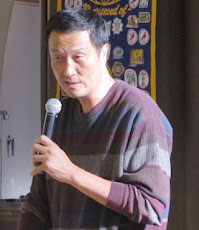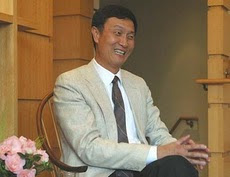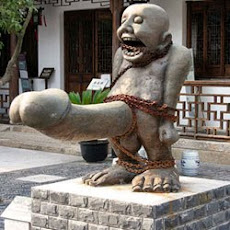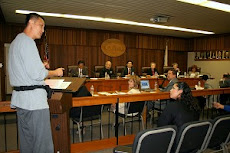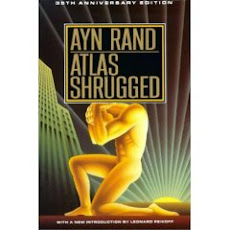
The Olympic Games: A Propaganda Victory for China? 陈凯访谈
http://frontpagemagazine.com/Articles/Read.aspx?GUID=B471699B-265E-43F1-92D1-1F3EF8E9A6BD
The Olympic Games: A Propaganda Victory for China?
By FrontPage Magazine
FrontPageMagazine.com | Friday, August 22, 2008
Frontpage Interview’s guest today is Kai Chen, a victim of China's Cultural Revolution who fled his home at the age of 15. He found salvation in basketball and rose to became a member of the Chinese National Team. He used this athletic skill to escape China and to eventually settle in the U.S. He is the founder of the Olympic Freedom T-shirt Movement and author of One In A Billion: Journey Toward Freedom.
FP: Kai Chen, welcome to Frontpage Interview.
Chen: Thank you.
FP: The current Olympic Games are being portrayed as a propaganda victory for China. Do you think that the Chinese government has succeeded in concealing the real nature of Chinese society from the international media? Has the international media attempted to look behind the new bamboo curtain?
Chen: The International Olympic Committee (IOC) is, and has always been, a corrupt organization. There has never been any control mechanism within that organization. It has paid only lip service on the human rights issues in China, and entirely ignored the illegitimate nature of the Chinese communist regime. In a big way, the IOC helps conceal the nature of the Chinese society - a post communist, but neo-Nazi society, and deceive the world as the Chinese communist regime intended to. I have to say that the IOC is a big sham in a big scheme to legitimize an illegitimate government. In some way the criminal communist regime has already succeeded in their deception from the start: President Bush was there, wasn't he?
With countless violations and tragedies caused by the Beijing Olympics Preparation Organization under the Chinese government, have you ever heard IOC squeeze a f--- toward the Chinese government. NBC which covers the Beijing Olympics, often using Tiananmen Square as the back drop, fails to mention Tiananmen Massacre in 1989. A deal somehow has been struck between IOC and NBC, wouldn't you say so?
But the real nature of the Chinese society as a real issue will never go away. The criminal government with its countless atrocities against humanity in the past and present has caused more than 70 million innocent lives in peace time. That issue will never go away, unless God is blind. The current anti-humanity activities by the Chinese criminal regime is still continuing. Falungong, Tibet, Christians, dissidents, one-child policy, corruption, supporting all the criminal regimes and groups around the world from Darfur to Burma to North Korea to Latin America with weapons and money. The world has to wake up to the Chinese threat, a threat to our own conscience, an invasion of our souls.
FP: One of the submotifs of the Games is China's apparent willingness to cheat to win. They hardly fielded a women's swimming team because their swimmers, once dominant, were decimated by doping violations. And now there are allegations that they have altered the ages of their gymnasts in violation of international rules. What does this say about Chinese society?
Chen: Nothing surprises me or shocks me in China. When I represented China in many international situations, my passport was civilian, even though I was an army man. Though in the 1970, illegal doping was unknown in China, because the regime was ignorant about it, by the beginning of 1990s, with the import of many East German coaches, doping was instituted as a government program to many athletes, especially women athletes. But just like in East Germany, (all the doping scandals only came out with evidence after the collapse of the Berlin Wall) the Chinese doping scandals will be exposed only after the future collapse of the communist regime with its archives eventually opened to the public.
The moral issue facing the individual Chinese athletes is: Does anyone eventually come forward to confess to the world of their drug use (forced or voluntary) under the supervision of the communist regime. Do they really want to return their gold medals? Does the under aged gold medalist have the freedom and courage to defy the entire Chinese society, their own families, their own community to admit these violations? If not, what is the moral consequences they will have to bear in their entire lives?
FP: One of the stories of the Chinese Games--even though it has not been deeply probed by the media--is the environmental devastation of the Chinese environment. How deep a problem is it? Is it possible for any environmental movement (outside a governmentally sanctioned one) to take on these problems in the way that western environmentalists have in their societies?
Chen: By Western standards, China should be officially defined as uninhabitable. The pollution issue is so big that no one in China, in the Chinese government, and possibly in the world, wants to face it, for the bigger, more pressing issue to the regime is how to deceive the entire population, how to prolong their control over the Chinese people by spiritually drugging them, how to stabilize a fundamentally unjust society (an impossible task). Food must be on the table, unemployment must be kept to the manageable level, dissidents must be crushed, the increasingly restless population must be pacified. Pollution and environment damage? What pollution and environmental damage?
Quite a few teammates of mine have already died of cancer in their 40s and 50s. Are they going to find out what caused their cancer? Do they have the means to find out? Quite unlikely.
FP: Some analysts have said that the "openness" shown by the Chinese government in terms of media coverage of the earthquake, combined with the international media's presence at the Olympics, will have a modest but permanent liberalizing effect on Chinese society. Is this so?
Chen: If there has been an "openness," it is not because the Chinese government wants to open, but because they have to change their policies in order to maintain their control over the population. On the one hand, they will have to continue to attract foreign investment to keep the economy humming. On the other hand, they also will have continue to build the information "firewall" - a new kind Chinese Great Wall, to keep all threatening elements, such as Christianity, Falungong, ideas of freedom and democracy out of the reach of the Chinese people. They now have employed 200,000 internet police to monitor the society. They also hired countless "50 cent" propaganda amateurs to help "lead" the public opinions toward government side, by demonizing the West, America, Christianity, Falungong, and people like me. My email contacts were recently attacked with viruses systematically from an unknown source.
"Open" or "closed" is only a tactic in the hands of an illegitimate government, insecure about its own future for the crimes it has committed against the entire population over the past 60 years.
FP: As you look behind the imagery of the Olympics--undoubtedly glamorous, but also airbrushed and sanitized, according to critics of the coverage--what kind of society do you see?
Chen: China is a fascist and neo-Nazi society. No one nowadays, including members of the communist party, believes in the ideology of communism - an ideology discredited world wide with the collapse of the USSR. But the Party-State structure left by the previous founders such as Mao is still very much intact. To make Mao's image everywhere in China, on the currency, in school campuses, on Tiananmen Square is a crucial government policy to numb the Chinese people's senses. To dismantle Mao's image, the National Anthem what espouses despotism, the National Flag that symbolizes individuals' submission to the collective, and the entire communistic organizational structure is not a task the communist party will ever possibly engage itself in. It depends on the organizational structure to survive another few years.
Evil's triumph is because not enough good people stand up. And no evil will disappear by itself.
FP: Kai Chen, welcome to Frontpage Interview.
Chen: Thank you.






































